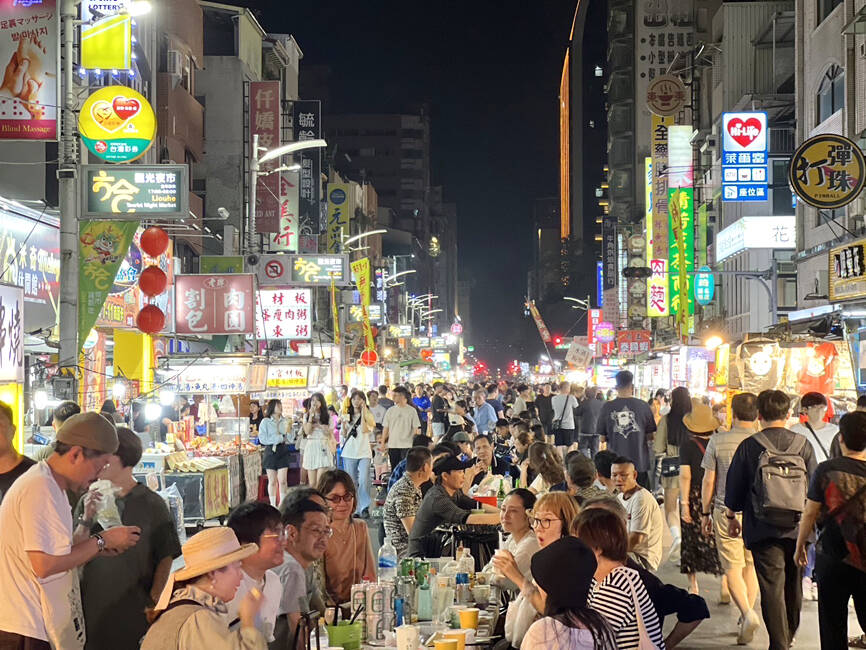Cheaper hotel rates and delicious street food made Taipei the most affordable city in Asia to visit in the second half of this year, a travel trend analysis conducted by Leisure and Travel magazine and the Web site Kayak.com showed.
Taipei and nine other Asian cities were selected as affordable travel destinations based on “average round-trip economy airfare” and “the average rate of a one-night stay in a standard double hotel room,” they said.
The results of their analysis, published on Wednesday last week, showed that the average cost of a round-trip flight and one night at a hotel in Taipei was US$1,141.

Photo: Ge You-hao, Taipei Times
“You can find highly rated hotels for under US$100 per night; many recent travelers to Taipei on Reddit report that they were able to find nice, but simple hotel rooms for US$45 a night, along with plenty of amazing street food like xiao long bao (Chinese steamed dumplings), bubble tea and mango shaved ice,” they said.
The city’s many night markets are a great place to find cheap eats and souvenirs, they added.
“If Taiwan’s beef noodle soup and pineapple cake are calling your name, now is the time to book,” they said.
Taipei was followed by Ho Chi Minh City and Jakarta, with a round-trip flight and one-night stay costing US$1,452 and US$1,478 respectively, the analysis showed.
The other affordable travel destinations in Asia were New Delhi, Bangkok, Manila, Tokyo, Kuala Lumpur, Hanoi and Osaka.
Kayak.com consumer travel trends expert Kayla Inserra DeLoache advised travelers to plan their trips during the “shoulder season” from October to November, when they can save up to 12 percent on flights compared with the peak travel season from May to July.

SECURITY: As China is ‘reshaping’ Hong Kong’s population, Taiwan must raise the eligibility threshold for applications from Hong Kongers, Chiu Chui-cheng said When Hong Kong and Macau citizens apply for residency in Taiwan, it would be under a new category that includes a “national security observation period,” Mainland Affairs Council (MAC) Minister Chiu Chui-cheng (邱垂正) said yesterday. President William Lai (賴清德) on March 13 announced 17 strategies to counter China’s aggression toward Taiwan, including incorporating national security considerations into the review process for residency applications from Hong Kong and Macau citizens. The situation in Hong Kong is constantly changing, Chiu said to media yesterday on the sidelines of the Taipei Technology Run hosted by the Taipei Neihu Technology Park Development Association. With

A US Marine Corps regiment equipped with Naval Strike Missiles (NSM) is set to participate in the upcoming Balikatan 25 exercise in the Luzon Strait, marking the system’s first-ever deployment in the Philippines. US and Philippine officials have separately confirmed that the Navy Marine Expeditionary Ship Interdiction System (NMESIS) — the mobile launch platform for the Naval Strike Missile — would take part in the joint exercise. The missiles are being deployed to “a strategic first island chain chokepoint” in the waters between Taiwan proper and the Philippines, US-based Naval News reported. “The Luzon Strait and Bashi Channel represent a critical access

CARROT AND STICK: While unrelenting in its military threats, China attracted nearly 40,000 Taiwanese to over 400 business events last year Nearly 40,000 Taiwanese last year joined industry events in China, such as conferences and trade fairs, supported by the Chinese government, a study showed yesterday, as Beijing ramps up a charm offensive toward Taipei alongside military pressure. China has long taken a carrot-and-stick approach to Taiwan, threatening it with the prospect of military action while reaching out to those it believes are amenable to Beijing’s point of view. Taiwanese security officials are wary of what they see as Beijing’s influence campaigns to sway public opinion after Taipei and Beijing gradually resumed travel links halted by the COVID-19 pandemic, but the scale of

Pope Francis is be laid to rest on Saturday after lying in state for three days in St Peter’s Basilica, where the faithful are expected to flock to pay their respects to history’s first Latin American pontiff. The cardinals met yesterday in the Vatican’s synod hall to chart the next steps before a conclave begins to choose Francis’ successor, as condolences poured in from around the world. According to current norms, the conclave must begin between May 5 and 10. The cardinals set the funeral for Saturday at 10am in St Peter’s Square, to be celebrated by the dean of the College